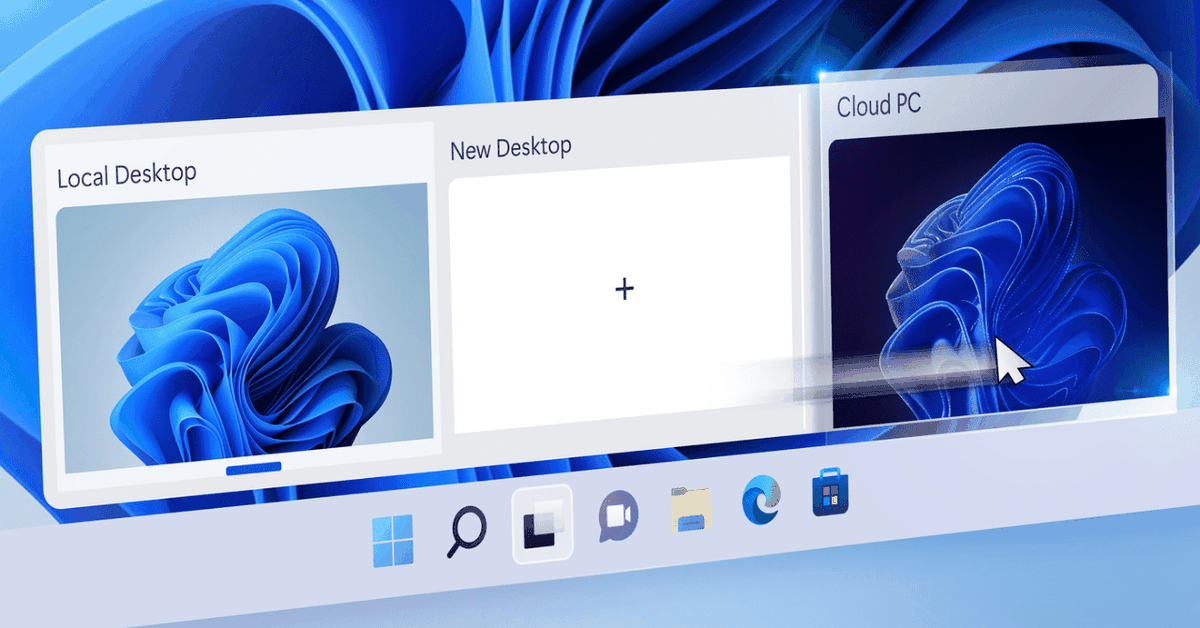If this happens, will it be a mass exodus to Linux/Mac? Or will people just live with it? The fact that the Steam Deck has shown great promise in playing games on Linux has made me reconsider Windows yet again.
That’s a click-baity headline that doesn’t really match the content of the article. Microsoft isn’t going to be replacing desktop Windows installations with cloud installations, and nowhere in the article does it suggest it is. Many, many businesses require Windows installed on the desktop (and no, many of those can’t switch to Linux, because the software they use is usually Windows-only). The article doesn’t dig into who is currently using Windows 365 to stream the OS, but I would assume it’s companies that are running computer kiosks, point-of-sale systems, or systems that would otherwise be extremely locked-down (like bank teller systems). Businesses that need system flexibility and resource-intensive applications aren’t going to be using a cloud-based OS. Pretty-much any business that does engineering or creative work falls into that bucket.
My interpretation of the article is that they want to extend cloud-based Windows to other users that have extremely lightweight requirements. The biggest market I see is the education market, where you generally want to provide students with very locked down functionality. The article mentions competition with Chromebooks, which is also huge in the education space. I could see this as a competitor to an iPad/tablet too, for those who mostly do browsing, email, or lightweight web-based MS Office tasks and want to have a keyboard and mouse.
TL;DR: People are wildly misinterpreting this article, and there isn’t going to be any kind of mass exodus to Linux because of Microsoft investing in Windows 365. Microsoft isn’t going to stop selling installable copies of Windows.
How might it be different from something like Citrix? Just an official way to do it? Maybe some integration with hosting?
I think it’s basically the same idea as Citrix. They’re targeting the same market, anyway, as far as I understand. I assume they each have their own pros and cons.
Its probably different in that money goes to Microsoft instead of Citrix.
I’m not an economist but that seems like a pro for Microsoft and a con for Citrix. Though, seemingly, Microsoft’s approach, naturally, centers around their own devices and OS rather than Citrix’s approach where just about every device/OS has an available application that can be used.
Its probably in direct competition to citrix.
For a recent job I had to sign into citrix to open a windows VM to access a corporate network. It was a pain, to be honest.
MS could have made that much easier if it was just a matter of signing in and getting some form of windows image streamed directly.
Citrix can do what you’re asking.
I would assume it’s companies that are running computer kiosks, point-of-sale systems, or systems that would otherwise be extremely locked-down (like bank teller systems).
As an example, we’re currently evaluating it as an option for doctors to access certain EMRs offsite where it doesn’t make sense to provide them an entire workstation, e.g., community doctors working from their private practices.
Microsoft isn’t going to be replacing desktop Windows installations with cloud installations, and nowhere in the article does it suggest it is.
I’d say Microsoft’s long term needle-moving strategy including the bullet point “Move Windows 11 increasingly to the cloud” suggests it pretty strongly. Calling it “needle-moving” says to me that they want the cloud to be more and more the expected default, rather than an option that exists alongside desktop installs.
Perhaps I’ve just read too many Microsoft business documents (I used to work for them years ago), but that’s not how I interpret that slide. It looks more to me like they want to “cloud-ify” functionality that could be used either from a desktop install or from a cloud streamed version. The key phrase in that slide to me is “Use the power of the cloud and client to enable improved AI-powered services and full roaming of people’s digital experience”.
That kind of fits with what they’ve been doing by moving Windows login to use a Microsoft Account by default (which I hate, btw – I’m one of those local account people), as well as integration of OneDrive as default file save location. It’s the same kind of thing Apple’s been doing with macOS for the past few years, adding iCloud integration with everything. If you move that functionality for desktop installs to mostly be cloud-based, it also allows you to create a more viable cloud-only offering. But it doesn’t mean there’s a reason to stop selling a desktop-installable version.
Microsoft is still a business, and they’d lose a ton of market-share by killing off desktop installs, especially in the enterprise sector, which is their bread and butter. They’re looking to expand into other markets, not kill off large existing ones.
Microsoft still sells single, non subscription licenses for Office. I think Windows is safe for the forseeable future, especially since they sell it to OEMs…
This was to be expected… But eventually… Microsoft will force people to the cloud… I just feel it… it’s happening…
I’m absolutely with you. Boiling frog and all. 10 years ago nobody would have believed that you’d require an online account to log into your local machine.
As soon as it’s viable from a business point of view (as in people will swallow it), it will be cloud only.
But what does Microsoft gain by that?
Subscription fees instead of single-buy licenses are generally more profitable after 1-2 years. This whole cloud crap is a pure vendors’ market.
Also, telemetry isn’t required anymore when users just use cloud services. That’s what made Google and Facebook big after all.
Microsoft isn’t going to stop selling installable copies of Windows.
I agree with most of your comment, but I bet Microsoft will what do whatever the market says will be most profitable, so nothing is off the table.
Yep, you’re absolutely right. I think my main point is that switching to only offering a cloud-streamed OS as their only offering would kill off a massive market where they have market dominance (enterprise desktops). It doesn’t make business sense for them to leave that market. If the demands of that market change, then you’re right – they’re going to do whatever is most profitable. But we’re nowhere near there yet.
yup, microsoft has made great strides in creating individual windows instances in the cloud for business purposes. This makes sense to their long term goals to support business. local installations are a different discussion.
Because why would a business buy a computer for $1k that they can write off by depreciating the value of, when they can not own a less useful, less powerful one that only works when there is internet for only $100 per month instead?
Glad someone is calling this out. Came from a link elsewhere and the headline just screamed no fucking way. Users won’t tolerate buying a machine only to stream the fucking OS from elsewhere. Sounds more like when I had to stream a desktop from AWS to access my schools licensed Adobe suite.
Actually, if you’re interested, gaming on Linux is great nowadays.
Nvidia GPUs are not really well supported, but they work.
However, if you game using Intel integrated graphics or an AMD GPU, the performance is perfect.
On steam I have yet to encounter a game that does not run well using Proton.My 1050ti had no problems on Ubuntu 20.04lts. I know if you want all the new bells and whistles on the new Nvidia cards that will be a disappointment. I think Nvidia has issues with Wayland, but X11 works
How does Proton work? Is it another application like wine?
It’s literally a fork of wine.
But from a practical perspective, you tell steam to start the game and it starts it, installing and using proton as necessary. If the developers haven’t configured it you have to first click a button in preferences that says “use proton” (paraphrased), but that’s it.
Also Steam can be configured to use Proton by default for non-native games :3
It isn’t just a fork, its a collection of tools and patches around wine tailored for a specific purpose.
DXVK, VKD3D and other components aren’t part of Wine or Proton’s Wine builds, for example. They’re extra tools used on-top of Wine.
How well are non-Steam games supported…?
It depends, the Heroic games launcher works well for GOG and Epic, and I’ve heard good things about Lutris too. For other games with their own launcher, you may have to follow certain instructions to get them to run.
Games like valorant are broken due to anticheat, but it’s basically malware and I wouldn’t install it anyway.
And how well do 3dsMax and Solidworks work? Cause Blender was the first modeling program I ever tried and couldn’t stand the UI, so that’s straight up not an option after 20 years of experience.
Depending on how long ago you tried blender the UI has improved significantly. As far as parametric CAD goes, supported options are still limited. For use in wine someone is working on making easy installers for fusion and solidworks that supposedly work but I just use a virtual machine.
Blender has come a LONG way in 20 years. I think it beats 3ds max in most categories these days.
For CAD I haven’t tried solidworks, but I did get Fusion to run. (Also fwiw, Onshape is surprisingly good, and is browser based)
I would love to use linux for everything I do on my computer but there are too many games I play that use anticheat that isn’t supported sadly. The use of intrusive kernel level anticheat will hopefully be killed off soon – but for now I have to keep a windows install so I can boot into it for those games.
Also VR I didn’t hear much good about on Linux. Especially if you don’t use native SteamVR Headsets. Also there is a game i do play which works with Linux fine itself but the video players do not.
Sure, why let users have any control over the product at all?
I’m bleeding Windows 10 for as long as possible. You guys DID say it would be the last version of Windows… and for me, it might be!Come to the dark side, Luke! Well, actually you’re on the dark side already. So how about trying to the light side for a change?
Until Linux can just let users double click and install .exe files from Windows. The average user will never touch it. People will just stick with what they know, even if it’s been neutered by being made into an online service.
That said, I don’t see Microsoft doing that for some reason. There are just too many things that aren’t suitable for an online instance of Windows. Not to mention that lots of areas don’t have a good enough network connection to make something like that viable. They’ll almost certainly continue to offer an installable version of Windows for a long time still.
I’d dare to say people don’t choose Windows, it is forced on them by having it preinstalled and that seals the deal for most. Your average Joe Sixpack would likely not even notice they are using Linux, since most just browse the internet and the major browsers are the same for both.
Tbh you can also be forced to windows by software. Like yes a lot of stuff works on wine and Proton but that doesn’t mean it runs good. For VR i didn’t hear much good especially if you don’t use a native SteamVR headset. Then there is lots of games with anticheat not working and whatever… So if you fall into any of these categories you’re kinda SOL.
Which is hilarious to me because how Linux handles application installations/updates though package management is so much easier than anything on the Microsoft side. No muss, no fuss, no chasing down dependencies, just “install X” and X is now cleanly installed on your system as well as everything it needs to run.
Until Linux can just let users double click and install .exe files from Windows.
Zorin OS allows to do that, and iirc you can do that with Wine on any other distro
Does it include MS office?
omfg people, read the article
In an internal “state of the business” Microsoft presentation from June 2022, Microsoft discuses building on “Windows 365 to enable a full Windows operating system streamed from the cloud to any device.”
So it’s not a firm strategic commitment but it would certainly make sense for them. They want everything to be subscription based and they want to control everything you do on your (or their) computer. There are still technical challenges but when they’ve worked those out, I think it’s a safe bet that this is where they’re going.
People is already moving away from having a desktop at home, and younger people are not even interested in having laptops, phone and tablet seem to suffice for most of them. From that perspective it makes sense to have a cloud computer that you can use no matter what device you own. Businesses are already moving this way with different types of VDI and cloud-native apps.
For us hardcore computer users, most likely we’ll finally jump to full-time Linux, but for work will still use the Cloud Windows when/where required.
For me it would be better to just have both options, and let me select, but knowing MS, they will make it near impossible to chose (like they currently do with the online account vs local account to sign in to the computer).
How are you having issues with getting a local account? It’s pretty straightforward to get one.
Worst case just disconnect the computer when you are installing Windows and it’ll force a local account…
This is not accurate for windows 11. Microshit turned windows 11 into spy shitstain worse than google android phones.
You have to use power shell to avoid it.
I’ve had enough. I am now a Linux gamer. fuck you bill gates
I am not having issues, they just made it complicated for the average user in Win11.
And no, installing offline does not force a local account anymore, it just keeps asking you to go online unless you do another workaround usually too complicated for the average user.
Linux has made astounding improvements to its every day usage in the past few years. There really truly are several distros now that you can install that “just work” out of the box. And with the modern DE’s, the user won’t even know much of a difference from the windows or mac interface.
People have been saying linux ‘just works’ for over a decade.
This simply isn’t true for the average user.
I mean, most installs start by asking you to burn an ISO to a USB. How do I format a usb stick? What’s NTFS? My USB stick is full, how do I empty it? Where do I put the thousands of pictures of my cat? Then you’re not unlikely to need to change settings in your bios, some versions don’t support secure boot. What’s a BIOS? How do I enter the bios? Do I need to open the computer? Is there a secret button or an app for that? Sometimes you get error codes. They don’t know how to google a fix. Then users have to relearn all the windows apps they’re used to. Then users have to install the linux equivalent of the apps they’re used to, and start learning all the differences. Then someone sends them a file in a proprietary office format and the formatting’s off. They’ll google excel, download the windows ‘app’, and become frustrated when it won’t install properly.
We’re talking about average users. Not people who’ve built their own pc. Average users are people who increasingly have trouble using a mouse, don’t get how directory structures work, and mainly use apps on their phone.
It’s a bit like car guys going on about how easy it is to change your own oil, to someone who’s never changed a tyre and doesn’t even know how to refill their windscreen washer fluid.
And even if an average user gets things installed and running, they’re going to run into graphical issues and lack of polish that pretty much every Linux DE and application has. Stuff like dialog boxes opening up that are too big to fit on a smaller-resolution screen; inconsistent use of widgets, fonts, and icons; help strings being misspelled or completely missing; applications that look wildly different from each other just because they use different GUI frameworks; etc.
Linux “just works” in the loosest sense possible, and I say this as someone who has been using Linux for many years. It’s certainly much better than it used to be in the early 2000s, but it continues to lack the design polish and cohesion of Windows and macOS, and that makes it rather off-putting for an average person to use.
The average user would have the same issues with Windows if they had to install it themselves.
The only way to get average users to start using Linux is to sell them the devices pre-installed with it.
Case in point: Android.
Enshit/subscripification of everything. You can thank Columbia House for showing businesses this model. I’m serious.
I simply can’t imagine that will be of much use for the CAD & GIS software I use.
plus there’s many options for both on linux
That’s financially untenable. Average cost to retrain on a new system is between 500-1000 hours to equivalent competency, per user, not including translation and recreation of new templates and automated processing routines - which are the backbone of modern engineering and architectural practices. At an average billing rate of $150/hr, that’s around $100,000 economic cost *per employee * just in lost time, plus actual training budget and software licenses.
Moving systems in established engineering businesses is wildly expensive and disruptive. I’ve worked through a couple in other offices, and had to navigate one or two in my own office. I would retire tomorrow rather than have to move my office to a new CAD system, and I don’t have nearly the legacy files of a larger firm.
Yay! Back to dumb terminals. Or Network Computers again
I think we’re almost there, really. A lot of places already have what is basically the terminal of today for users to use. It’s just a little box with keyboard, mouse, and monitor, and maybe some USB ports, and it connects the user to a virtual machine running on a server in the building somewhere.
deleted by creator
The PC gaming community alone would kill this plan. Data caps make game steaming for long periods untenable and Valve has explicitly been focusing on Linux and Proton for the last decade to try and prepare for Microsoft doing something like this. Apple just released their game conversion toolkit or whatever that shows promise for (relatively) quick and easy ports of Windows games to M2 Macs. Having a streaming connection to play games would be laughable to anyone in the eSports community and would immediately result in companies abandoning Windows.
I assume most people will stay at windows, since (from what i know) most people are afraid of changes + only used windows.
This sounds horrible…
I’ve love to give Linux a real hard try, but my employer is every much a O365 org… Not fully sure what sort of issues that would give me.
Not many issues to be honest. You could even install Microsoft Edge on Linux and use that to access O365.
Anything but edge!
Honestly, besides my gaming PC at home… Almost all of the application I run are web-based or have an alternative. The one downside I can think of is that most of the documents I do access and update are housed within OneDrive.
I mean, you don’t have to use Edge, any modern browser should work. I use Brave mainly, and have not had any issues with O365. You can use OneDrive on the browser, but even if you want it synchronized to your desktop there’s a few ways to sync it to Linux:
https://github.com/jstaf/onedriver#readme - FOSS with GUI
https://github.com/abraunegg/onedrive#readme - FOSS CLI (but there is a GUI for it, and a System Tray icon if desired)
https://www.insynchq.com/linux - Proprietary commercial product
Thanks for sharing.
I used Brave for a few years and just recently switched to Firefox . No real reason.
Do they allow you to use the web browser version?
You could always try booting up a Live CD and testing it out. It’ll run a bit slower than a native install, but it’s a super-easy way to check things out.
I should just make a test partition at home, or at least a virtual box/etc.





























